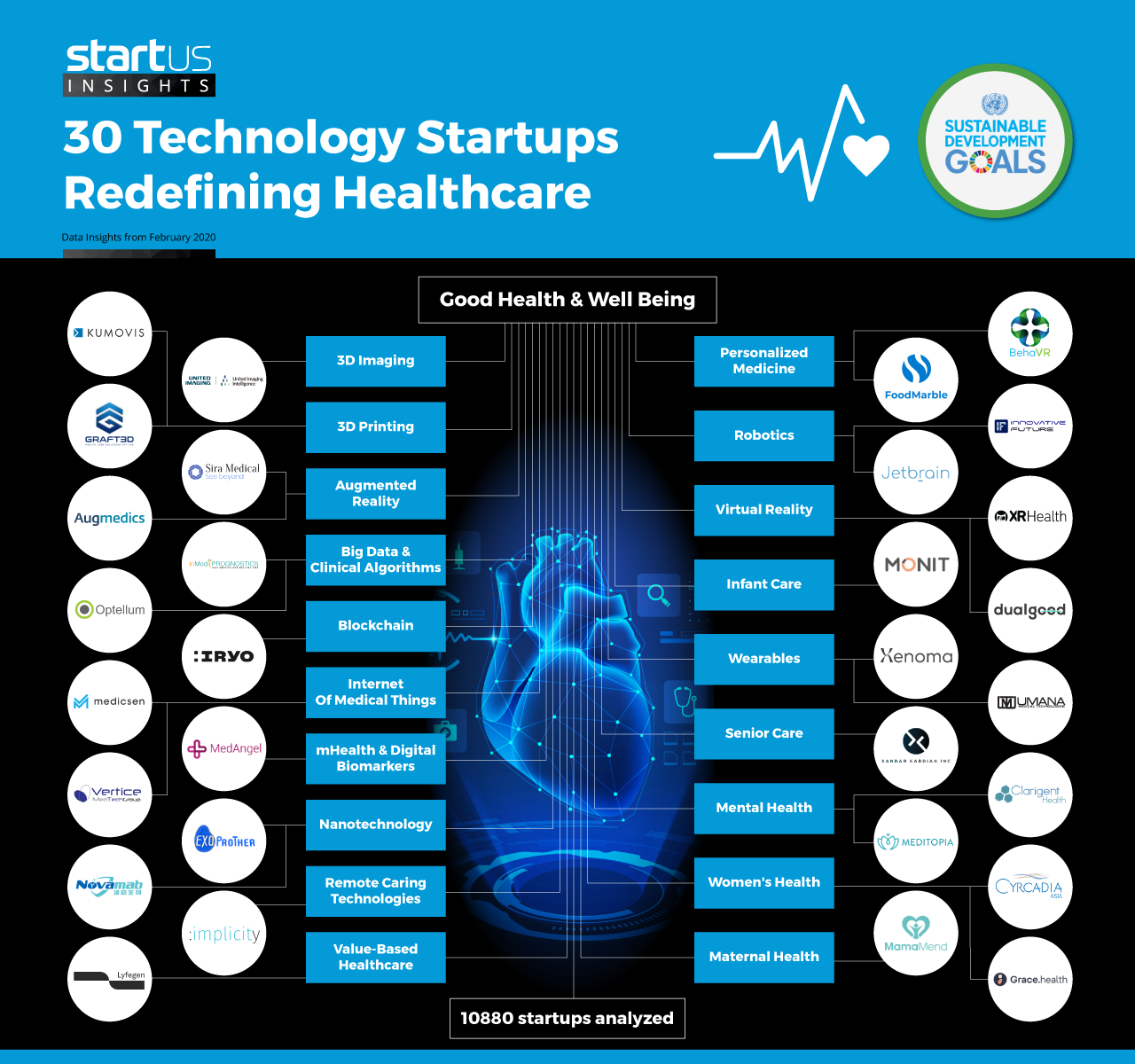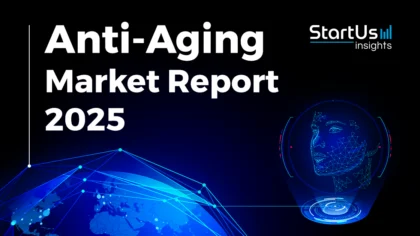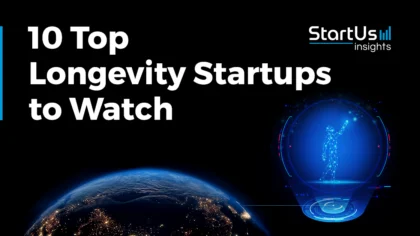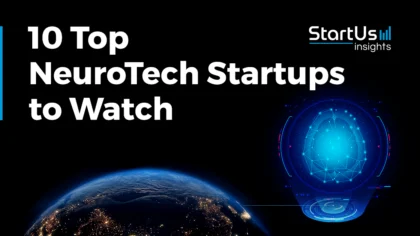Accelerate Productivity in 2025
Reignite Growth Despite the Global Slowdown
The United Nations has set 17 diverse goals for its member states with the aim of achieving sustainable development that benefits all humans, animals, and the environment by 2030. Increasingly, entrepreneurs and well-established companies alike are working on ways to contribute towards achieving at least a part of these sustainable development goals (SDGs). This time, we present the key innovation areas and innovative startups working in HealthTech.
Our StartUs Insights Platform covering more than 1.116.000 startups & emerging companies, enables us to provide you with highly relevant sets of solutions, in this case, those that contribute toward the progress of the UN SDG. For this series of articles, we analyzed more than 10.000 startups & emerging companies developing innovative technologies that align with the UN’s SDGs.
Innovations In HealthTech: 2020 & Beyond
Innovations in healthcare and wellness span a range of technologies. Traditionally speaking, healthcare data and information have usually been collected and stored neatly for many years now, albeit in paper form. The digitization of health data and information, known as eHealth, opens the door for applying analytics and informatics techniques to vast amounts of patient and hospital data.
Partly or completely, it is business-as-usual issues that hinder countries in efficiently delivering public services, which in turn slows the progress of the UN-SDG program. With the gradual standardization of data collection systems, innovators have a multitude of options for developing technology-driven health and wellness solutions.
Our Healthcare Innovation Map covers all major technologies and solutions impacting the industry right now. Our goal is to showcase HealthTech startups that are working on solutions that are, or potentially could, accelerate the progress of achieving the UN SDG #3 – Good Health & Wellbeing.
Heat Map: HealthTech Startups Impacting Good Health & Well Being
We analyzed 10.880 HealthTech startups and emerging companies working on solutions for the healthcare and wellness sector that are highly relevant for accelerating the progress of the third SDG of ‘Good Health & Well Being’.
3D IMAGING
Medical imaging is at the heart of many patients’ diagnosis and treatment. Good imaging can help clinicians spot the earliest signs of an emerging medical condition. The more accurately we capture and model images of our bodies, the better the chances of detecting diseases early. This is life-saving for many patients.
3D imaging technologies potentially address this SDG’s challenge: faster detection of major diseases like malaria and tuberculosis, and in turn, a faster diagnosis. There is an urgent need for efficient diagnostic solutions as many patients suffer undue financial hardships in search of better healthcare.
1. United Imaging Intelligence
United Imaging Intelligence is a medical imaging HealthTech startup headquartered in Shanghai. This Chinese startup develops uAI, an imaging platform that detects multiple diseases from a single scan. For example, their OneScan package enables multiple-disease diagnoses for the chest with a single CT scan. They use artificial intelligence (AI) to accelerate the scanning process and to include the various modalities from different medical imaging equipment. They also offer a research and collaboration platform to enable the development of different AI applications in the field of healthcare.
3D PRINTING
The broad applications of additive manufacturing, also known as 3D printing, in the field of healthcare are bioprinting tissues or organoids, printing surgical tools, printing patient-specific surgical equipment, and customized prosthetics. The possibility of printing bones and implants that mimic human biology opens the door for customized solutions based on each unique disability.
3D printing makes healthcare cheaper for those who are in the most pain. The number of people suffering from disabilities requires high quality and more personalized solutions for truly comfortable lives. The very fact that such solutions already exist is enough for increased investments in this technology.
2. Kumovis
German HealthTech startup Kumovis develops 3D printing systems for medical applications. These systems are designed to manufacture a range of medical products that require both rapid prototyping or personalized implants. The Kumovis R1 printing system uses fused-layer manufacturing for a variety of thermoplastic materials. They use proprietary slicing software and printing technology to allow their clients to simply provide a model file and to receive the finished product.
3. Graft 3D
Indian HealthTech Graft3D manufactures patient-specific implants (PSI) using metal additive manufacturing technology. PSI is designed to improve the form, function, and aesthetics of implants by tailoring them to the needs of the patient. They convert images from CT or MRI scans into software files compatible with 3D modeling and printing. These models are fed into a metal printer for creating the required implants. They use direct metal laser sintering (DMLS) technique that allows for a high degree of customization.
AUGMENTED REALITY
The work of a surgeon is very time-sensitive, as the patient’s health and life are often on the line. Augmented Reality (AR) overlays high-quality visualization, or 3D objects, onto real-world surroundings, creating a potent medical tool. This includes an overlay of CT-scans over the patient’s body, reconstruction of tumors in AR, and much more.
According to the UN, 40 percent of the world has fewer than 10 doctors for every 10,000 people. Augmented reality helps the industry in addressing this shortage by efficiently training many more doctors. At the same time, AR helps surgeons perform their tasks more accurately with less time spent on it.
4. Sira Medical
Operating from San Francisco in the US, Sira Medical is a HealthTech startup offering AR for medical applications. Their RadHA platform, an acronym for Radiology with Holographic Augmentation. This application allows surgeons to better explain the procedures to patients while identifying critical areas to navigate during surgery. Their technology enables medical practitioners to view 3D radiology images by overlaying them into the real background.
5. Augmedics
Operating from the US and Israel, Augmedics is a HealthTech developing the xvision system, a high-tech tool to project a 3D model of a CT-scan onto a patient during spine surgery. This technology effectively gives the doctor an X-ray vision and enhances the precision of surgical interference. A personalized headset comes equipped with high-speed processors, a transparent AR display, and a built-in surgery tracking system.
BIG DATA & CLINICAL ALGORITHMS
The majority of health data is collected passively, that is, patients are not logging their details, but rather the points of healthcare services log the data. Image recognition software combined with machine learning helps clinicians to diagnose diseases using patient images and records such as photos, test results, x-rays, and other medical images.
The targets set by the UN to achieve the goal of good health for all requires doctors to get empowered to deliver an efficient, swift, and accurate diagnosis. To be able to achieve some of the targets by 2030, like ending epidemics of malaria, tuberculosis, and other neglected diseases, we need algorithms trained to spot diseases and detect anomalies faster.
6. Optellum
Based in Oxford, UK, Optellum develops clinical decision support software for personalized early diagnosis & treatment of lung cancer. This system is based on artificial intelligence (AI) and machine learning algorithms applied to one of the world’s largest clinical datasets.
7. InMed Prognostics
Indian HealthTech startup InMed Prognostics offers a cloud-based clinical decision support tool called NeuroShield – neural network-based predictive analytics for various neurodegenerative disorders. By feeding it medical imaging data, the software assists physicians in diagnosing and proactively managing patients. Leveraging data analytics and deep learning techniques, they develop a biomarker algorithm for various neurological disorders, starting with pediatric epilepsy and dementia.
BLOCKCHAIN
When it comes to healthcare, blockchain technology offers a unique tamper-proof electronic medical record (EMR) management system with higher privacy and interoperability. Though commonly associated with blockchain, these features are vital for improving access to healthcare for millions of people around the world. Trustless collaboration offers a way out of today’s messy healthcare networks.
The UN believes that concerted efforts are required to achieve universal health coverage and sustainable financing for health, to address the growing burden of non-communicable diseases. Blockchain technology opens the door for reduced complexity in health information exchanges (HIE) and exchanging electronic health records (EHR).
8. Iryo
Slovenian HealthTech Iryo designs an open EHR gateway cryptocurrency for maintaining and exchanging health data and records. Based on a standardized, zero-knowledge data storage, and blockchain access control framework, they empower research and development with a large repository of data, they enable patients to have total control over their health data and provide healthcare providers with real-time medical history for improving the quality of treatment.
INTERNET OF MEDICAL THINGS
By monitoring an individual’s vital signs and automatically adjusting the amount of drug to be delivered, drug delivery systems help the patients to stay within a safe range, preventing abnormal dosing situations. Automatic drug delivery systems consist of a wirelessly connected implanted medical device and an external drug delivery device.
There is a greater risk of damaged medication when it gets compromised by exposure to temperatures beyond its safe range. Smart sensors monitor the environment temperature and conditions and alert users if they are close to a critical point or if medications already get spoiled. Such efficient technologies are necessary for improving access to healthcare – essential for achieving this SDG.
9. Medicsen
Spanish HealthTech Medicsen develops a smart patch for non-invasive drug delivery systems for diabetes patients. The patch is guided by their learning algorithms or activated manually by the user. It provides easy access to relevant individual personalized health data. The predicted glucose levels help in delivering only the required amount of insulin on a daily basis.
10. MedAngel
Dutch startup MedAngel helps people monitor the temperature of their medications and insulin. They develop a mobile app and, together with a small sensor, enable users to monitor their medications using their smartphones. The solution also covers the last-mile of cold chain management and enhances medication safety.
MOBILE HEALTH & DIGITAL BIOMARKERS
Biomarkers are bodily indicators that are measured to determine the condition of a patient. Cholesterol levels are biomarkers for potential cardiac diseases. Mobile Health, or mHealth, uses a combination of biosensors, wearable devices, and digital biomarkers that constantly monitor the user’s data, alerting them when the biomarker levels are abnormal.
Tuberculosis (TB) remains a leading cause of poor health and death. Though some of the results are encouraging, there are still large gaps in detection and treatment and the UN believes the pace of progress will not be sufficient to achieve the targets. Such digital monitoring technologies accelerate the process of detecting TB, which plays a major role in the ensuing treatment.
11. Vertice Medtech
Based in Pretoria, South African HealthTech startup Vertice Medtech offers mobile healthcare and digital health solutions, among a range of healthcare services for Sub-Saharan Africa. They incorporate various digital channels such as AI, ML, health sensors for tracking, robotics, and postable diagnostics to offer comprehensive health solutions. They enable African healthcare institutions to adopt digital health technologies for improving access to healthcare, diagnosis, and treatment.
REMOTE CARING TECHNOLOGIES
Using artificial intelligence (AI), along with remotely connected monitoring devices, allows medical practitioners to efficiently analyze data from patients and improve their healthcare. For people with chronic diseases, implanted monitors combine characteristics of therapeutic and monitoring devices such as pacemakers, blood indicators, monitors for metastasis. This ensures there is sufficient data for remote doctors to analyze and prescribe treatment.
Remote caring devices have the potential to address the pressing challenge of helping those affected by neglected tropical diseases. The UN estimates that over 1.5 billion people suffer from such diseases and the numbers have improved slightly, mainly because of improved surveillance. Remote caring also allows a few doctors to monitor, diagnose, and suggest treatment for a large number of patients who are in dire need of healthcare.
12. Implicity
French HealthTech Implicity works on a remote monitoring platform for patients with connected pacemakers and defibrillators. An artificial intelligence module determines the criticality of each alert, considering the medical context of the patient. The platform analyzes and filters the data coming in from remote locations, freeing up valuable time for electrophysiologists to focus on essential tasks.
NANOTECHNOLOGY
Nanotechnology, along with nanomedicine, considerably accelerate the developments in regenerative medicine, drug delivery, and vaccine efficiency. Novel concepts allow patients with organ failures or severe injuries to get artificial skin, bone, cartilage or other tissues.
The ability of nanomedicine to provide targeted slow-release vaccine delivery improves vaccine efficacy and in turn, the intended outcomes. This will prove vital in the UN’s efforts to support research and development of essential vaccines for several diseases in developing countries. Improving vaccinations plays a major role in ultimately achieving the goal of providing universal affordable healthcare.
13. Novamab Biopharmaceuticals
Shanghai-based HealthTech Novamab Biopharmaceuticals develops novel nanobody-based drugs, with the aim of improving upon existing drugs. By conducting high-level nanobody research, Novamab establishes an integrated, systemic, and global R&D platform, including nanobody discovery, pre-clinical, and clinical stages. Adopting novel ways of drug discovery and development, this HealthTech startup helps in realizing the medical value of nanobodies.
14. nanoTropic
Brazilian HealthTech nanoTropic develops and produces an antimicrobial nano additive capable of permeating materials such as plastic, paper, ceramics, and paints, with bactericidal and fungicidal properties. This increases the validity of food, control vectors for nosocomial infections, and substantially mitigates the action of microorganisms in numerous applications.
PERSONALIZED MEDICINE
The latest artificial intelligence (AI) and machine learning technologies help identify patterns within genetic datasets so that computer models can make predictions about an individual’s odds of developing a disease or responding to interventions. Predictive analytics for personalized medicine enables doctors to make decisions based on demographics, biomarkers, genetics, and drug levels to provide patients with a personalized dose.
By 2030, the UN aims to substantially reduce the number of deaths and illnesses from hazardous chemicals, air, water, and soil pollution and contamination. Depending on a person’s immunity, environment, and habits, these types of pollution may have different effects on different people. Personalized medicine provides the opportunity for catering to the varying factors that affect patients and providing them with individual treatment.
15. FoodMarble
Irish startup FoodMarble designs and develops a personal digestive tracker that detects the amount of hydrogen in human breath. Aiming to solve the highly prevalent digestion disorder problem, this simple but powerful solution captures the hydrogen released by undigested food that travels from the gut, through the blood, to the mouth. The tracker empowers users to understand which food works for their digestion system and supports them to transition to better diets.
16. BehaVR
Based out of Nashville, USA, the HealthTech BehaVR develops a health platform for building stress resilience, emotional regulation, and the activation of healthy behaviors. Their platform creates experiences that activate cognitive, emotional, and physiological responses with the goal of improving health. These experiences empower individuals and lower barriers to health, with personalized educational content, emotional regulation skills, and stress resilience techniques.
ROBOTICS
The ability to manipulate a sophisticated robotic arm by operating controls combined with AR provides surgeons with better chances for successfully completing complex surgeries. Rehabilitation robots, equipped with sensors and advanced interaction control systems, continuously monitor and adapt their support to the state of the patient. Service robots are designed to assist clinical staff with logistical tasks and deliver supplies, medications, and meals by combining AI and advanced indoor navigation systems.
The UN estimates that more than 55 percent of countries have fewer than 40 nurses and midwifery personnel per 10,000 people. Combined with the shortage of doctors in several countries, robots present a unique opportunity for rapidly expanding health services. By allowing robots to take up repetitive and menial tasks, it frees up valuable time for medical practitioners to focus on essential and complex tasks in healthcare.
17. Jetbrain Robotics
Based out of Gurgaon in India and Hong Kong, Jetbrain Robotics is a HealthTech startup developing end-to-end autonomous mobile robots (AMR) solutions to assist with nursing & managing internal logistics, enabling hospital staff to focus on essential tasks. This safe autonomous transport uses AI, machine vision, and indoor navigation techniques to provide hospital staff with medical transportation and patient care assistant robots.
18. Innovative Future
Hailing from Minsk in Belarus, Innovative Future provides digitization strategies and solutions to help healthcare institutions balance costs, deliver superior customer experience, and improve process efficiencies. By employing robotic process automation (RPA) techniques like streamlining manual, transactional tasks, and operations, data intake processing, digitization of patient files, optimizing appointment scheduling, executing billing and claims processing, and inventory management automation.
VALUE-BASED HEALTHCARE
High prices for some generic drugs in recent times have once again raised the question of shifting to value-based healthcare practices. Though spoken often in terms of healthcare payment, it includes some other important aspects of healthcare that need reforming. From fostering collaboration between science and research and patient needs to improving healthcare stakeholder relationships, the industry begins a slow and tedious shift into fair health practices and affordable health products.
The UN aims to achieve universal health coverage, including financial risk protection, access to quality essential health-care services and access to safe, effective, quality and affordable essential medicines for all. Value-based healthcare models and services have the potential to accelerate the pace of progress for this target.
19. Lyfegen
Swiss HealthTech startup Lyfegen develops a digital healthcare platform aiming to accelerate the shift to value-based pricing & contracting. The platform enables automated and scalable healthcare pricing and integrates with various data sources to retrieve patient outcomes for given cohorts as well as determines the price payable based on the conditions set by the manufacturer and payers. Using smart contracts and distributed ledger technology, Lyfegen’s platform enables patients, payers, providers, and manufacturers to enter value-based pricing agreements with near real-time data, alerts, and notifications.
VIRTUAL REALITY
Today, treatments for chronic pain using drugs have harmful side effects and prove to be ineffective in the long term. Virtual Reality (VR) offers a way for patients to undergo therapies that distract them from thinking about pain and facilitates a more natural pain relief procedure. In addition to such treatments, VR is useful in training practitioners and bringing about awareness about almost all health topics.
The UN targets significant reductions in the numbers for suicide, tobacco-related deaths, and other forms of substance abuse and addiction. VR is one of several technologies in development to reduce user dependency on these substances. By working on infrastructure obstacles, countries will benefit from stronger societies with low mental health concerns.
20. XRHealth
Israeli startup XRHealth develops virtual reality software for medical and wellness applications. Their products focus on rehabilitation care, pain management, and patient data analysis. One of their flagship products, VRReliever, tackles patient pain through complex and pleasing interactive imagery in VR. They offer a range of virtual reality solutions for healthcare, medical, fitness, and wellness purposes.
21. Dual Good Health
Based in London, Dual Good Health develops virtual reality software for emergency medical training. They offer a range of VR-based training modules for healthcare staff, emergency and paramedic staff, and obstetrics specialists. The real-life like training simulations allow trainees to spend long hours on training and experience improved learning outcomes. All their training curriculum is based on national and international standards.
WEARABLES
Active smart fabrics memorize the shape, display a сhameleon effect, regulate temperature, resist water, absorb vapors, and heat the fabric. Medical-grade textile is capable of capturing millions of signals on the skin and unlocking a wide range of biometric insights including heart rate, respiratory rate, temperature, breathing, stress, movement, acceleration, and hormone levels.
According to the UN, inadequate and unsafe drinking water, sanitation, and hygiene are linked to more than 800,000 deaths globally. Along with air pollution, millions of lives are affected every year simply because of where people live or certain aspects of their lifestyle. By continuously monitoring a user’s health information, wearables facilitate the detection of illness and conditions faster, allowing the user to seek help before it is too late.
22. Xenoma
Operating from Tokyo, in Japan, Xenoma specializes in system integrations for smart apparel. Its stretchable electronics technology, Printed Circuit Fabric (PCF), includes sensor calibration and magnetometer-free motion capturing algorithms and combines it with Xenoma’s e-skin smart apparel. It uses a Bluetooth module that is plugged into the chest to transmit data to nearby devices running Xenoma’s custom software. The range of e-skin apparel is designed for everyday use.
23. Umana Medical
Based on the Mediterranean island of Malta, Umana Medical is a wearable HealthTech developing the SmarterSkin Sensor and a heart monitor. This tattoo sensor ensures the accuracy and quality of the data collected. It acts like a second skin, dispensing the need for cumbersome and irritating skin patches. Using this one sensor, users get reliable information about heart and respiratory rate, fall detection, and atrial fibrillation. The data is then sent for analysis to their cloud platform that utilizes pattern recognition techniques and alerts the user in case of any abnormal readings.
MENTAL HEALTH
There is a range of mental health remedies and treatments that vary in utility and complexity, depending on the individual’s condition. Some of them are simply for relaxation, deep breathing, and other techniques to help manage stress and anxiety. In more severe cases, AI, AR, and VR-based mental health programs provide clinicians with valuable methods and tools for diagnosing and treating major depression, anxiety disorders, and cognitive and memory problems in adolescents, adults, and senior individuals.
However, suicide remains the second-highest cause of death among people aged 15 to 29 globally, according to the UN. As more practitioners get involved in developing the tools necessary to combat complex mental health issues, families and societies must also develop healthy communication with their children to help avoid falling into the mental traps that get triggered by everyday events.
24. Meditopia
With offices in Berlin, Germany, and in Istanbul, Turkey, Meditopia is a wellness startup developing a meditation app that helps reduce stress, improves sleep quality, and teaches calmness for the body and mind. It provides personalized meditation sessions, bedtime stories, focused on different topics and music to relax.
25. Clarigent Health
Clarigent Health, from Ohio in the US, develops a platform that uses artificial intelligence (AI) and machine learning technologies for the early detection of mental health conditions and as a clinical decision support tool to find the most appropriate treatment plan for a person. By monitoring behavioral health vitals, they intend to prevent mental health issues from overwhelming various members of the society during a period of crisis or trauma.
WOMEN’S HEALTH
Many women lack access to healthcare services. In order to democratize health services for women, solutions like female health chatbots provide users with fast, accurate, and affordable health information directly from experts – instead of getting it from the internet. According to statistics, breast cancer is the most common cancer in women worldwide – and early detection is the key to successful treatment.
The UN realizes that expanding access to modern contraceptive methods is essential to ensuring universal access to sexual and reproductive health-care services. A decline in adolescent fertility rates is also a welcome milestone. In general, empowering women with information to understand sexual health and its effect on their lives will help millions of women make informed, important life decisions.
26. Grace Health
The Swedish company Grace Health develops a female health assistant as a chatbot — an instant, private, and free way to get instant answers to women’s sexual & reproductive health questions. It also allows a woman to track her period, symptoms, and fertility, as well as get fertility alerts. Grace is a CE-marked medical device.
27. Cyrcadia
Hong-Kong-based Cyrcadia develops itBra – intelligent wearable patches for breast health monitoring and early diagnostics of breast cancer. The patches track circadian temperature changes in breast tissue. Then anonymized data is transmitted to Cyrcadia’s core lab for analysis. The results of the analysis are available within minutes and can be shared with a doctor, insurer, or family member.
MATERNAL HEALTH
The postnatal period is the most critical and yet the most neglected phase in the lives of mothers and babies. Most maternal and newborn deaths occur during this period. Smartphone apps assist new mothers by guiding them through this important time, helping to save them and their babies’ lives.
The UN estimates 303,000 women around the world died due to complications of pregnancy and childbirth in 2015. Important milestones have been reached for this target, with over 81 percent of live-births happening in the presence of a skilled attendant. More research on reproductive and maternal health topics will go a long way in addressing these preventable deaths.
28. MamaMend
Based in the US, HealthTech MamaMend is a personalized, evidence-based, week-by-week guide to childbirth recovery and postpartum health. The app offers personalized, supportive, and evidence-based content. It covers topics such as postpartum mental health, breastfeeding, thyroid health, pelvic floor conditions, and much more.
INFANT CARE
Health monitoring systems for infants, based on wireless communications, prove to be reliable and efficient for both parents and doctors to help ensure better infant care. Such systems monitor parameters such as body temperature, pulse rate, and movement of an infant, and relay this information to the parents in real-time.
The UN estimates that more than 5 million mortalities for children under the age of 5. A majority of these deaths are preventable and more than half happened within the first month of life, considered the most crucial for child survival. With better monitoring, health tracking, and streamlined health management systems, technology can potentially save the lives of millions of infants.
29. Monit
Seoul-based Monit specializes in smart baby care solutions that comprise a diaper monitor, air quality measurement hub, and mobile app that monitors the state of the baby’s diaper, the humidity, and the temperature of the baby’s surroundings. In addition, they develop a smart baby carrier that offers comfort for the baby and the parent.
SENIOR CARE
The senior people of society often suffer the most because of changes in pollution levels or technology. Health technologies designed for senior members of the society are similar to those for infants. Connected devices and wireless data transmission help caregivers keep a closer eye on their seniors, with real-time alerts and notifications.
While the UN does not single out this category of people in the goals, they are very much included in the sustainable development goal of ensuring good health for all ages. As populations grow, medical institutions must innovate to find ways to address every patient. Such senior care technologies can potentially reduce this burden while making their lives a lot easier and safer.
30. Xandar Kardian
Operating from New York, with a research and development lab in South Korea, Xandar Kardian develops wireless detection of various digital markers. Fall detection, resting heart rate and breathing monitoring, vital signs monitoring, and sleep apnea monitoring are their main services. All devices monitor the data wirelessly and send it to their platform for analysis. Seniors view their tracking data in their smartphones and make any necessary adjustments.
What’s Next?
The Sustainable Development Goals are designed for all stakeholders in society. Healthcare institutions all over the world have pressing issues to deal with. Adopting and collaborating with intelligent technology will significantly boost the quality of health services.
Patients see increasing opportunities to monitor their health in more efficient ways, detect abnormal conditions, and access targeted treatments. Even healthy people now find innovative and simple ways to maintain a nutritious diet and exercise regularly – essential for preventing several diseases.
The growing number of startups and companies aligning their offering with the Sustainable Development Goals is an encouraging sign. All stakeholders must do their part in helping achieve these goals.










